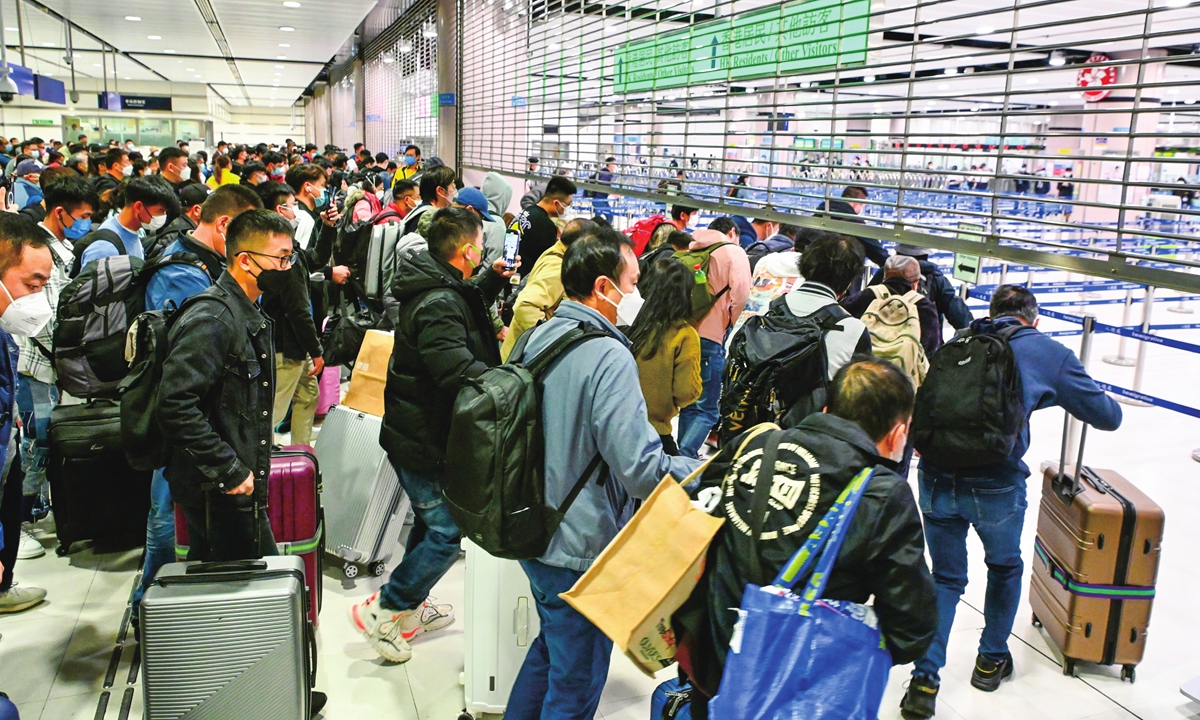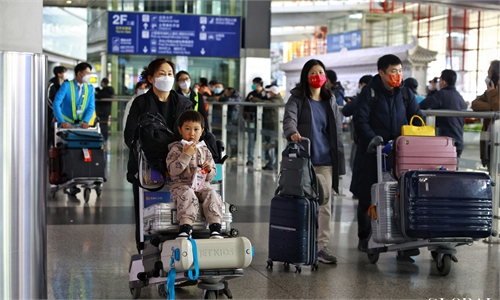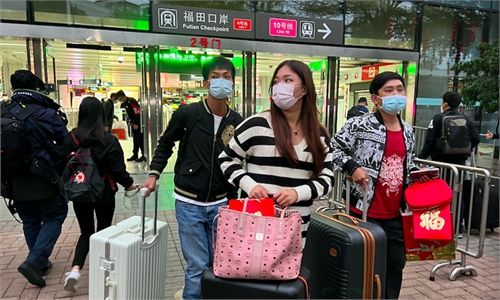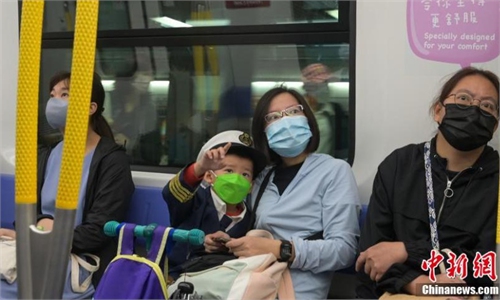Border reopening injects vitality, hope for HK's economy
Recovery may be slower than expected, but businesses optimistic as normalcy resumes

At about 6:30 am on January 8, 2023, a large number of passengers take the subway at the reopened Lok Ma Chau Station in Hong Kong to enter Shenzhen, South China's Guangdong Province. Photo: VCG
For Hong Kong's business communities, the border reopening with the Chinese mainland is widely deemed as the "biggest New Year's gift" in three years. The city's economic pillars, such as retail and tourism, are ready to welcome an influx of visitors from the mainland, which is expected to inject much-needed vitality into the ailing economy, although the road to recovery may be slower than expected.Andy Lee, a manager in a fine-dining restaurant in Hong Kong's Central District, said he had received floods of reservations from visitors from the Chinese mainland, after the government announced that the border would reopen on Sunday.
"We have the whole of January fully booked out. Eighty percent of all reservations are for after the first three days of the Chinese New Year [which falls on January 22], which is much more than the same period last year," Lee told the Global Times on Monday.
The China Travel Service (CTS) branch located just inside bustling Hung Hom Station is among the tourist agencies that were battered by the COVID-19 pandemic in the past three years. A staffer surnamed Gu told the Global Times that during the epidemic, the number of employees in her agency halved, as did the number of CTS branches in Hong Kong. Previously, there were about 20 branches.
"Prior to the epidemic, we were really busy, and the office was filled with tourists," Gu said.
Gu's agency stopped setting monthly sales targets for employees. Still, many of Gu's colleagues and friends in the industry left to make a living, with some getting involved in work related to the epidemic, such as nucleic acid testing and quarantine sites.
As the border reopens, Gu believed the good time for the tourism industry will come soon. "As the border reopens, employees will come back to the industry, and our branches that closed will reopen. My agency is working on rolling out travel products appealing to tourists from the mainland."
Hong Kong topped the list of destinations of mainland travelers after China announced the downgrading of COVID-19 management.
Appointments for mainlanders' applications to travel to Hong Kong were fully booked on Monday, the second day after such processing resumed. Tour groups are not allowed just yet.
Economists are upgrading their forecasts for Hong Kong this year as the city accelerates its reopening with the Chinese mainland and other parts of the world. The median estimate in a Bloomberg survey of 12 economists last week was 3.3 percent growth for 2023, higher than the 2.7 percent forecast in a survey of 25 economists in November, Bloomberg reported on Monday.
Hong Kong's tourism sector lawmaker Perry Yiu told the Global Times that he went to the Hong Kong Macau Ferry Terminal to receive the first batch of passengers traveling from Shenzhen's Shekou Port on Sunday.
"Only dozens of passengers were on that ferry, which can carry nearly 300 people. But we are excited anyway, because it's hope. The border opening between the mainland and Hong Kong is historic, and it is an important step for our tourism recovery," said Yiu.
The pandemic is not the only thing that bruised Hong Kong's economy. The continuous social riots in the latter half of 2019 also discouraged tourists from coming, said Timothy Chui, director of the Hong Kong Tourism Association.
"Yet after three and a half years, Hong Kong has come to a clearer realization of the importance of mainland tourists. Tourism has brought Hong Kong abundant opportunities, from grassroots service personnel, bus drivers and hotels…Hong Kong cannot live without mainland travelers, the city and mainland need a border reopening."
Mainland tourists were the biggest group of Hong Kong's visitors in previous years. In 2018, 78 percent of the 65 million who visited Hong Kong were from the mainland. Yet from January to November 2022, only 443,986 people visited Hong Kong, and slightly more than 307,000 were from the mainland, according to official statistics.
The city's retail sector lawmaker Peter Shiu told the Global Times that two-thirds of Hong Kong's monthly consumption revenues comes from Hong Kong residents. Nearly one-third is from foreign tourists and 80 percent are from tourists from the mainland, Shiu told the Global Times.
The jewelry industry, cosmetics and watches, and electronics suffered the most in the past three years, and even some leading brands have halved their branches to reduce costs.
Thus, the border reopening is seen by Shiu as the "first signs of the dawn" for Hong Kong's wholesale and retail industries. He believed the city's wholesale and retail industries will gradually return to normal. A complete recovery will come when mainland cities overcome the COVID-19 peak of infection and more tourists will be more willing to travel.
To embrace the opportunity brought by border reopening, many companies are ramping up efforts to increase their manpower, and re-rent and redecorate their shops. Pharmacies have also boosted their drug reserves such as fever-reducing medicine to meet potential high demand from tourists, said Shiu.
Insiders from Hong Kong's tourism industry predict the recovery, however, will be slower than expected. "Probably we will wait a year after it returns to the pre-pandemic level," said Chui, citing concerns such as shortages of employees, financial difficulties and the current quota on people traveling from both sides.
"There won't be a V-shaped recovery of the Hong Kong tourism industry, but probably a huge bounce back will be expected after the Chinese Spring Festival." Yiu said. "We will be happy if tourism in 2023 recovers to 60 percent of the pre-pandemic era."





